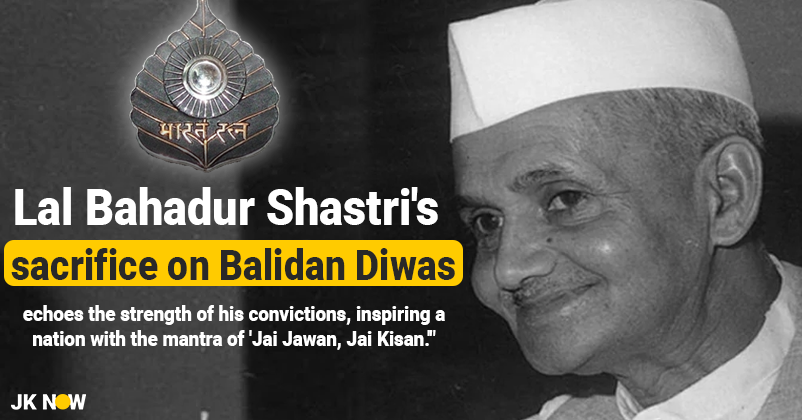11 January, 1966: "Balidan Diwas: Commemorating the Martyrdom of Bharat Ratna, Lal Bahadur Shastri"
Total Views |

Lal Bahadur Shastri, the second Prime Minister of India, was a visionary leader who dedicated his life to the service of the nation. On January 11th, India observes Balidan Diwas, a day to commemorate his selfless sacrifice and unwavering commitment to the country. This article aims to shed light on the significance of Balidan Diwas and pay tribute to the remarkable legacy of Lal Bahadur Shastri.
Balidan Diwas, also known as Martyr's Day, marks the anniversary of Lal Bahadur Shastri's untimely demise in 1966. Shastri's sudden passing in Tashkent, Uzbekistan, just a day after signing the historic Tashkent Declaration, left the nation in shock and mourning. This day serves as a reminder of his immense contribution to India's freedom struggle and his relentless pursuit of peace and progress.
Lal Bahadur Shastri's life exemplified simplicity, humility, and integrity. Born on October 2nd, 1904, in Uttar Pradesh, he grew up in a modest family and faced numerous hardships. However, his determination and commitment to education propelled him towards a path of public service. Shastri's involvement in the Indian independence movement and his unwavering dedication to Mahatma Gandhi's principles earned him the respect and admiration of the nation.
As Prime Minister, Lal Bahadur Shastri faced several challenges, including the 1965 Indo-Pak war. His leadership during this critical period showcased his courage and strategic acumen. Despite limited resources, Shastri's call for "Jai Jawan, Jai Kisan" (Hail the Soldier, Hail the Farmer) united the nation and instilled a sense of patriotism in every Indian. His emphasis on self-sufficiency in agriculture and defense laid the foundation for India's progress in subsequent years.
The Tashkent Declaration, signed just hours before his demise, was a testament to Shastri's commitment to peace and diplomatic resolution. This historic agreement aimed to restore peace between India and Pakistan following the 1965 war. Shastri's sudden demise left the nation mourning the loss of a leader who had dedicated his life to the welfare of the people.
Lal Bahadur Shastri was posthumously awarded the Bharat Ratna, India's highest civilian award, in 1966. He was honored for his exceptional leadership, dedication to public service, and his significant contributions to the nation.
Lal Bahadur Shastri's Balidan Diwas is a poignant reminder of a leader who prioritized the welfare of the nation over personal comfort. Shastri's simplicity, integrity, and dedication to public service earned him immense respect. He was a man of the people, often leading by example, and his sudden demise left the nation mourning the loss of a beloved leader.

